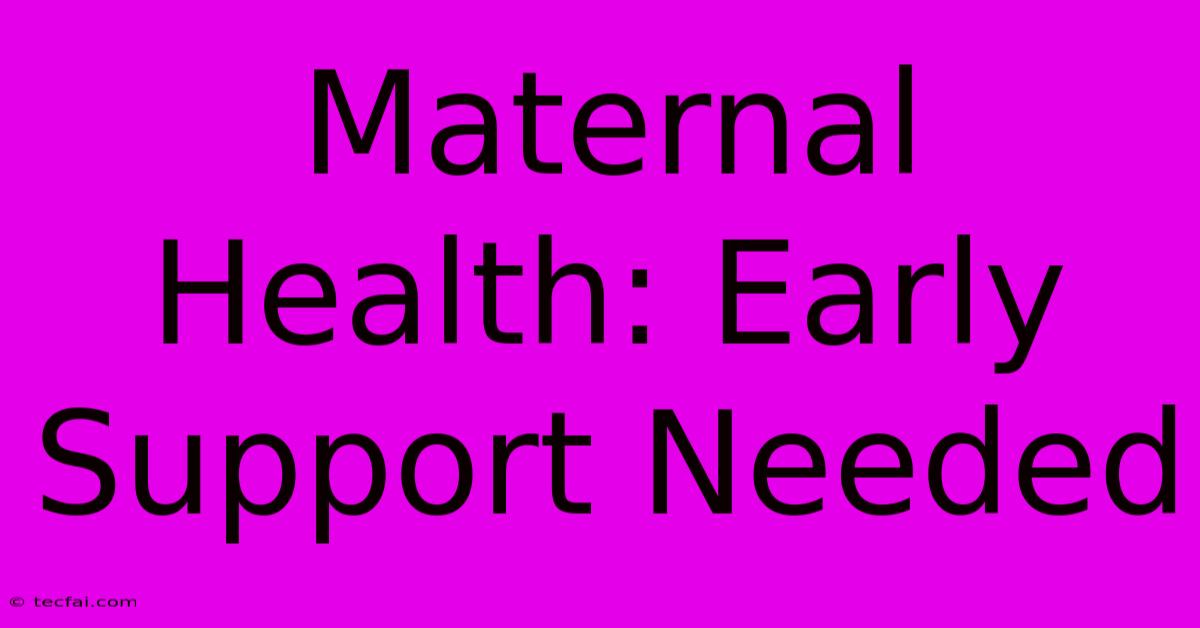Maternal Health: Early Support Needed

Discover more detailed and exciting information on our website. Click the link below to start your adventure: Visit Best Website tecfai.com. Don't miss out!
Table of Contents
Maternal Health: Early Support Needed
Maternal health is a critical aspect of global health, encompassing the physical and mental well-being of women during pregnancy, childbirth, and the postpartum period. Unfortunately, far too many women lack access to the crucial early support they need, resulting in preventable complications and tragic outcomes. This article explores the importance of early support in maternal health, highlighting key interventions and advocating for improved access to care.
The Critical Window: Early Pregnancy and Beyond
The foundation for a healthy pregnancy is laid long before conception. Accessing quality healthcare early in a woman's reproductive life is paramount. This includes:
- Preconception counseling: Discussing family planning, health risks, and lifestyle modifications (like diet and exercise) with healthcare providers can significantly improve pregnancy outcomes.
- Early prenatal care: Regular check-ups starting in the first trimester allow for early detection and management of potential complications like gestational diabetes, preeclampsia, and infections. Early intervention is key to preventing severe complications.
- Addressing underlying health conditions: Pre-existing conditions like hypertension, diabetes, and heart disease need careful management throughout pregnancy to minimize risks to both mother and baby. Ignoring these can lead to serious, potentially life-threatening, consequences.
The Postpartum Period: Often Overlooked
While pregnancy and childbirth often receive significant attention, the postpartum period is equally critical, yet frequently overlooked. This period, lasting approximately six weeks, is characterized by significant physiological and psychological changes. Early support during this time is vital for:
- Postpartum depression and anxiety screening: These mental health conditions are common and can have severe consequences if left untreated. Early identification and access to appropriate care, including therapy and medication if needed, are crucial.
- Breastfeeding support: Many new mothers struggle with breastfeeding. Providing access to lactation consultants and support groups can significantly improve success rates and contribute to the baby's health.
- Family planning: Postpartum is an ideal time to discuss family planning options and ensure access to contraception to prevent unintended pregnancies.
Barriers to Accessing Early Support
Despite the importance of early support, many women face significant barriers to accessing these crucial services:
- Geographical limitations: Women in rural or underserved areas often lack access to qualified healthcare providers and facilities.
- Financial constraints: The cost of prenatal care, childbirth, and postpartum support can be prohibitive for many women, especially those without health insurance.
- Cultural and social barriers: Cultural beliefs and social stigma can prevent women from seeking early prenatal care or discussing their health concerns with healthcare providers. Breaking these barriers requires community engagement and culturally sensitive healthcare approaches.
- Lack of awareness: Many women may not be aware of the importance of early prenatal care or the support services available to them. Increased health literacy campaigns are necessary to address this gap.
Strengthening Maternal Health Systems
Improving maternal health requires a multi-pronged approach:
- Investing in infrastructure: Expanding access to healthcare facilities, particularly in underserved areas, is critical.
- Training healthcare professionals: Investing in the training and education of healthcare providers, particularly midwives and nurses, is vital to ensuring high-quality care.
- Implementing effective policies: Governments need to implement policies that guarantee affordable access to maternal healthcare services for all women. This includes ensuring adequate funding and expanding healthcare coverage.
- Community engagement: Engaging with communities to address cultural and social barriers, promote health literacy, and provide support is crucial.
Early support for maternal health is not merely a matter of improving individual outcomes; it is an investment in the well-being of families and communities. By addressing the barriers to access and strengthening healthcare systems, we can work towards a future where all women receive the care they need to experience healthy pregnancies, safe deliveries, and healthy postpartum recoveries.

Thank you for visiting our website wich cover about Maternal Health: Early Support Needed. We hope the information provided has been useful to you. Feel free to contact us if you have any questions or need further assistance. See you next time and dont miss to bookmark.
Featured Posts
-
90s Group Ends Friendship
Dec 03, 2024
-
New Mothers Need More Support
Dec 03, 2024
-
Williams On Second Child Uncertain Love
Dec 03, 2024
-
E17 Star Blocks Christmas Song Release
Dec 03, 2024
-
Jonathan Davids Timely Hot Streak
Dec 03, 2024
